ARTICLE AD BOX

By Jonathan Jurejko
BBC Sport
Image source, Getty Images
Image caption,Rafael Nadal won 16 of his 21 Grand Slam titles with his uncle Toni as head coach
From the first ball Toni Nadal threw towards his three-year-old nephew, he could see there was something different about the kid lining up a shot on the other side of the court.
Once a top Spanish amateur player who competed in the national championships, the coach had hundreds of children come under his watchful eye at Manacor Tennis Club on his home island of Mallorca.
"When I hit the ball to Rafael, he went towards it. He didn't wait for the ball to arrive to him," Toni tells BBC Sport.
"Normally, when I sent a ball to a small kid, he stood and waited until the ball arrived at him. But my nephew, he went looking for it. For me, this was special."
That assessment proved to be right. Rafael Nadal was a special talent and, with Toni shaping him as a player and a person, the 35-year-old has gone on to prove it.
No player in history has won more Grand Slam men's singles titles than Nadal.
The Spaniard equalled Roger Federer's all-time record of 20 major victories at the 2020 French Open, with Serbia's Novak Djokovic joining them on the same number after winning Wimbledon.
On Sunday, perhaps in the most unlikely major win of his career, Nadal lifted his second Australian Open title to surpass Federer and Djokovic.
Australian Open: Rafael Nadal completes 'unbelievable' comeback to win 21st Grand Slam title
Yet, as Nadal has so often acknowledged, it is doubtful he would have achieved the same scale of success without the man known throughout the tennis world as 'Uncle Toni'.
There are many tales of Toni's tough-love tutelage. Without them, a youngster described by his sister Maribel as "a scaredy-cat" may never have transformed into the 'raging bull' we know on court as one of the most ferociously competitive athletes of his generation.
Other than the terracotta courts, you would be hard pressed to find many similarities between Manacor Tennis Club and Roland Garros.
Manacor is a typical Mallorcan village and the tennis club - several clay courts overlooked by a medium-sized clubhouse which houses a restaurant and sun-filled terrace - is similar to many on the Mediterranean island.
Toni, who turns 61 in February, was in his early 30s when Nadal first joined in with a small group of children he was teaching.
In the very early days of their time together on court, when Nadal was still part of the wider group, he would be treated differently by his uncle. But this was no case of nepotism.
The young Rafael - described by Toni as mild-mannered and quiet at that age - used to get annoyed by what he felt was overly tough treatment.
"I demanded a lot from Rafael because I cared a lot," says Toni.
Nadal's mother Ana Maria recalls how her young son used to arrive home from training in tears but wouldn't reveal what was upsetting him.
Once he told her Toni had called him a 'mummy's boy', and she wanted to confront her brother-in-law. Nadal insisted she shouldn't make a fuss and asked her to keep quiet to avoid "making things worse".
Image source, Getty Images
Image caption,Nadal turned professional in 2001, playing on the second-tier ATP Challenger Tour when he was 15
Nadal has said his uncle used to shout and try to frighten him, sometimes leaving him with a "sinking feeling in his stomach" if he saw it would be just the two of them training together.
If the young boy's mind drifted off while they were on the court, Toni used to knock balls towards him to grab his attention.
At the end of practice, Toni insisted Nadal had to pick up all the scattered balls and sweep the red dirt, while the other kids wandered off home. If he forgot his water bottle, he had to train without rehydrating in the hot Mallorcan sun.
Toni says all of this, laid bare in his nephew's 2011 autobiography, is true.
"I believe in the work and I believe in the players who are strong enough to cope with the intensity of this work," he tells BBC Sport.
"I cannot understand another style of life. In my opinion you always have to know your place in the world.
"This is why I was like this with Rafael. I knew he could cope."
Image source, Getty Images
Image caption,Nadal pictured aged 14 in 2000 after winning Les Petits As, a prestigious annual youth tournament held in France
When an 11-year-old Nadal won the Spanish Under-12s national title, Toni's sterner side was on show again.
At a small gathering to celebrate the success, Toni dampened the mood by reeling off the names of the past 25 winners. He'd called the Spanish Tennis Federation to obtain them, posing as a journalist.
Nadal had only heard of five; those who had gone on to play professionally. Toni, apparently with a sense of triumph, insisted it highlighted his point: he only had a one in five chance of doing the same.
Another such example came a few years later when Nadal, now 14, buoyantly returned home from an international tournament in South Africa - the furthest he had ever travelled.
He had enjoyed experiencing a different culture, seeing wild animals like elephants and lions for the first time, and he had come back victorious.
In his autobiography, Nadal explains how a homecoming party was organised by one of his godmothers, with a banner featuring a message that was supposed to be "celebrating and deflating at the same time".
Nadal never got to see it. Toni whipped the banner off the wall, rollicked the godmother, stopped the youngster from going into the party and called him in for training at 9am the next day.
"I wanted him to know that everything he achieved at that age was not very important in terms of the bigger picture," Toni says.
"I wanted to dampen the expectation. I wanted him to know it was only a little step and if he wanted to progress he had to continue to work very hard."
Image source, Getty Images
Image caption,Nadal takes some pointers from Toni at the 2009 Australian Open
Nadal's father Sebastian, Toni's brother, sometimes wondered if his younger sibling was pushing his son too hard. His wife also had reservations.
Outside their inner circle, some people - looking back through the lens of almost 30 years of time and changing attitudes about welfare in sport - might question Toni's methods.
In his book, Nadal revealed how he felt his uncle contributed to him being "more insecure", but in the passage that follows explores this idea only in a sporting context - suggesting there were times when he "played beneath himself".
Toni says he only "wanted the best" for his nephew.
"I was hard on him, but not strict," he adds. "I was tough for his greater good."
There were "not too many" family disagreements, he says, and Sebastian and Ana Maria certainly did appreciate how important Toni was to their son's hopes of becoming a professional tennis player.
That was part of the thinking behind their decision to reject a tennis scholarship that would have meant a move to Barcelona when he was 14.
Nadal himself, even at such a young age, knew the partnership with Toni was special and was also reluctant to leave for the Spanish mainland.
"I did not want to leave home and I'm glad [I didn't] looking back," he said in his 2011 book Rafa: My Story, which was written with British author John Carlin.
"[Even though] Toni was grating on my nerves, I knew I had a good thing going with him.
"Because Toni was right. So often infuriating but, in the long run, right."
During last year's Madrid Open, television promos used cinematic drone shots of the Spanish capital's historic Las Ventas bullring in dramatic build-up for Nadal's matches.
The Mallorcan's personal logo, which adorns his on-court clothing, is an abstract depiction of two lightning bolts representing a bull's horns.
But his family joke about how, both from a young age and even still now as he turns 36 this year, he doesn't like the dark, preferring to sleep with a light or the TV on, and hides under cushions whenever there is a thunderstorm.
The 'Raging Bull' persona - typified by endurance, intensity, relentlessness, a refusal to accept he is beaten - is one built by Uncle Toni.
"I was a coach who took care more of forming and strengthening Rafael's character than to form him technically," he says.
The core skills which have enabled Nadal to win 21 Grand Slams, 37 Masters and virtually every other honour in the sport are still evident in his matches today. And they can be traced back to specific examples of Toni's tough approach in his youth.
Endurance, probably the most important word in the Nadal mantra, was built up in both the physical and mental sense by the long, unbending training sessions with Toni.
The indomitable spirit was encouraged by matches of first to 20 points, where the elder Nadal would let his protege get to 19 before upping his level and pipping him to victory.
Putting mind over matter was fostered when he played with a broken little finger in a Spanish Under-14s tournament, going on to win with a "limp, lifeless, digit" because he didn't want to show any signs of weakness to Toni.
The ability to play with clarity under pressure and problem-solve on court also came from his uncle - "the all-knowing magician of my childhood" - who would constantly analyse his mistakes.
Image source, Getty Images
Image caption,Nadal has often spoken about the importance of his tight-knit family, who all still live in Manacor but are almost always seen watching his matches across the world. Here, he exchanges 'high-fives' with father Sebastian, watched by sister Maribel, wife Maria Francisca and mother Ana Maria, after winning the 2020 French Open title
All these qualities have been apparent in Nadal's greatest triumphs: for example, the titanic five-setter against Roger Federer that landed him a first Wimbledon title in 2008, or the way he outlasted Daniil Medvedev to win first the 2019 US Open, then the Australian Open on Sunday.
"Play every point as if it is your last," Toni says is the message he drilled into his nephew.
The fact Rafael is still winning Grand Slams in the twilight years of his career, and beating much younger men who have not faced the same physical issues caused by almost 20 years on tour, means it is nonsensical to suggest he relies solely on the will of his body and mind.
Clearly, his all-round technical proficiency - an improved serve which is hard for opponents to break, the ability to viciously finish points on both forehand and backhand wings, smart-thinking and sharply-executed net play - is among the very best.
Toni does not take any credit for that.
"I think I gave him the commitment to the sport, to be always with his brain active and alert, to never give up. One of the most important things I said to him was that he needed to improve always," he says.
"At the same time, I say you need to improve, but always I thought improving was possible because he had the natural talent."
Toni often jokes that he ticked two important boxes to be a good coach for Nadal.
"Firstly, I'm his uncle and it is harder to fire a relative than anyone else. The second is that I was the cheapest coach out there," he says with deadpan delivery.
Nadal won 16 of his 21 Grand Slam titles under his uncle's watchful eye. In 2017, Toni decided he had enough of travelling across the world and retired from his role as Rafael's head coach.
While it could be easy to presume from the stories that Toni was a tyrannical figure, demanding and irascible in equal measure, it is not a fair portrayal.
Nadal speaks about the "fun and magic" in their relationship, while those who know him well talk of a man who is serious and forthright, but also amenable, generous and with a sharp sense of humour.
"For all the haranguing I got from Toni, I am not one of those athletes whose life stories are all about overcoming dark beginnings in their rise to the top. I had a fairytale childhood," Nadal wrote in his book.
Image source, Getty Images
Image caption,Toni retired from Nadal's team in 2017, but has returned to the tour on a part-time basis, working with Canadian player Felix Auger-Aliassime at the Grand Slams and other leading events
Nowadays Toni is in charge of Nadal's academy in Mallorca, a short walk along a tree-lined avenue from the Manacor Tennis Club where it all started, trying to create tennis stars of the future through coaching and education based on the family values.
The pair remain close - as does the whole Nadal clan, they all still live in Manacor - with Toni describing their relationship as a "normal" one between uncle and nephew.
Nadal's game is never discussed, however. Even though Toni still watches some of his matches - he was seen in the stands at last year's Madrid Open - he does not get involved.
When Rafael won his 10th French Open title in 2017 - Toni's final Roland Garros as his coach - the beaming uncle came on to Court Philippe Chatrier to present the trophy. Pride shone across his face, love between the pair emanated as they shared a tight hug.
"If we could go back to when I started playing tennis with Rafael and you said he would win 21 Grand Slams, I would have said it was impossible," says Toni.
"But now because of the path he has taken - winning Grand Slams almost every year and improving his tally - it feels normal.
"We have proven that a normal kid from Manacor - with effort, with sacrifice - has managed to achieve the many goals which he set when he was young."
A version of this article was first published in May 2021.

 3 months ago
19
3 months ago
19








 English (US) ·
English (US) ·